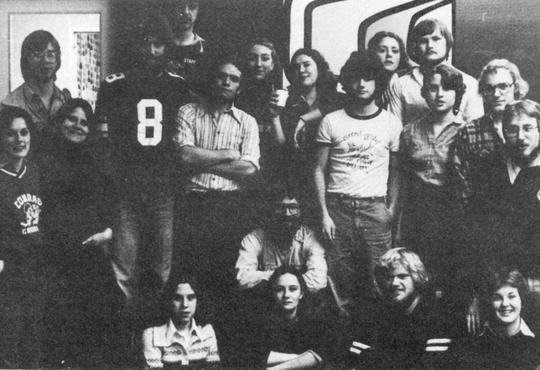At the beginning of October, I attended Community Supper for the first time since I was a Grebel student over 22 years ago. I was struck by how little had changed in over two decades: round tables, enormous slices of homemade bread, comical announcements, a friendly atmosphere, and a warm welcome. It’s hard to describe—or to overstate—how good it felt to be back. Those meals anchor my memories of student life at Grebel—filled with friends and mentors, good conversations, and lasting connections.
The Wednesday ritual of Community Supper was introduced by our first President, Winfield Fretz, in 1964—eight years before I was born. This deliberate weekly meal is unique on the University of Waterloo campus. It was (and is still) seen as an example of Fretz’s many social innovations, which were intended to create a welcoming culture and a closely-knit community.
With Community Supper, Winfield drew on much older traditions of common or “formal” meals, which have been held for centuries in colleges at places like Oxford and Cambridge. He introduced a very old custom to a brand new place. Arguably, he improved on the tradition. He insisted on round tables (rather than long rectangles) so that people could meet each other face-to-face, and dropped the formal robes which were customary at much older colleges.
So, was Winfield being “innovative” or “traditional” when he started Community Supper?
We think and puzzle about innovation all the time at Grebel because we are part of the University of Waterloo. For the 26th consecutive year, Waterloo was once again named as Canada’s “most innovative” comprehensive University in this year’s Maclean’s rankings, and we’re proud to be part of an institution with that reputation. Ask our students what they are learning, and Waterloo’s innovative drive becomes clear: some are in disciplines, fields and sub-fields that did not even exist when I was a student here. (I confess that I’m not entirely sure I understand what some of them are studying, even after they explain it to me!)
This issue of Grebel Now highlights many ways that Grebel has sought to be innovative in its programs—from the Centre for Peace Advancement, to the Anabaptist Learning Workshop, to the thriving PACS program that we introduced to the University 40 years ago.
Nevertheless, embracing innovation is not an automatic impulse at Grebel, given our commitment to traditions of liberal arts education and to the continuity of the Mennonite church. In the world of business and technology, innovation is often touted as an end in itself. Facebook founder Mark Zuckerberg famously told his employees to “move fast and break things.” Would it be wise to approach our College in that way?
One of the most interesting questions I was asked in preparing for my new role was: “What is your attitude towards innovation, and how does that apply to Grebel?” My answer is that we should always be eager to innovate, but not simply for the sake of being innovative.
We innovate in pursuit of our mission: to “seek wisdom, nurture faith and pursue justice and peace in service to church and society.” That means that we are always open to new ways to build our community and to creative solutions to old problems. Perhaps it also means that not everything needs to change. Some good things only need to be nurtured and sustained. Community Supper is one example—Winfield Fretz got that one right the first time. May it endure.





